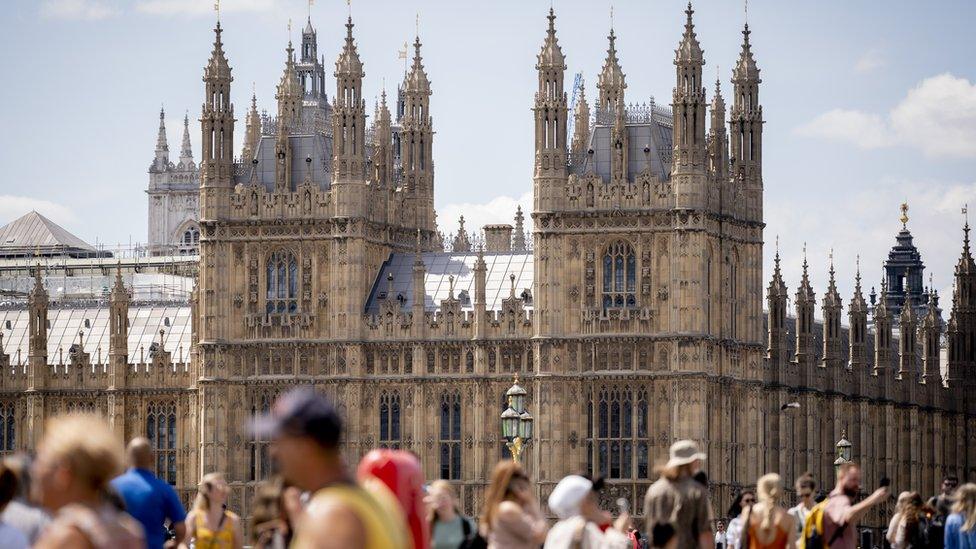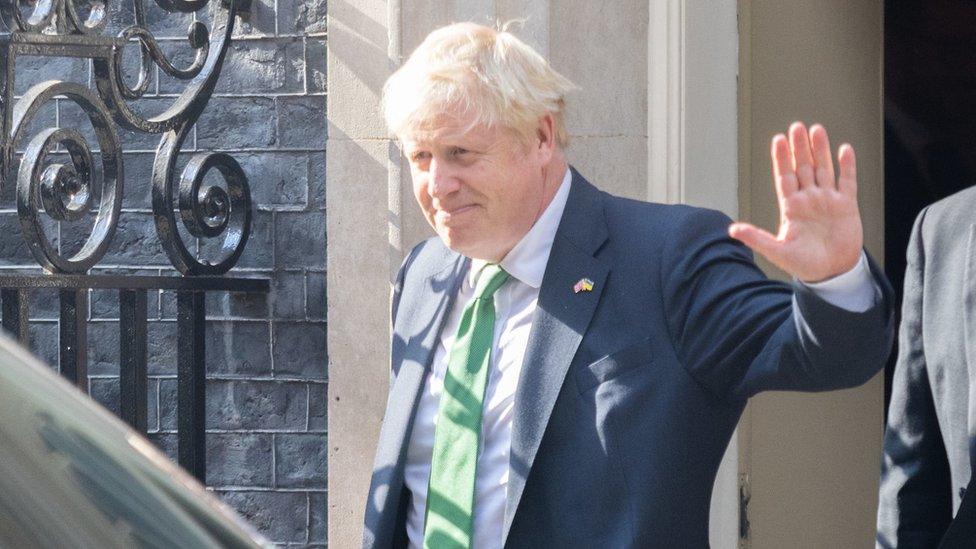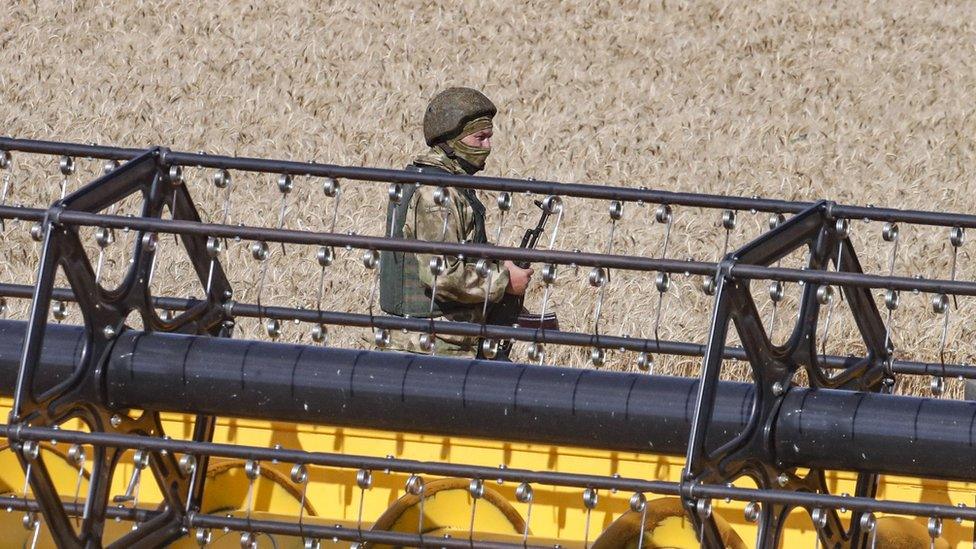What's happening in Parliament this week?
- Published

There is an agenda for the last week of Parliament before the summer recess, but it will be completely overshadowed by the drama of the Tory leadership contest.
Even the detailed legislating that is under way - notably with the Northern Ireland Protocol Bill - could be overtaken by the decisions of the incoming PM in September.
That may be the fate of the Online Safety Bill, now that its final day of detailed consideration has been postponed from the coming week until at least September.
The bill has been criticised by one leadership contender, Kemi Badenoch, as "legislating for hurt feelings," much to the displeasure of Culture Secretary Nadine Dorries.
So Parliament will swelter on, its deliberations a sideshow, until Hon. Members and Noble Lords head off for their summer recess at the close of business on Thursday.
The real action will be in the Tory leadership ballots, and the inevitable wheeling and dealing around them.
There are the spoils of government office to be divided under a new leader, and the exercise will inevitably create new winners and new losers.
Some of the latest set of promoted MPs, elevated after last week's resignations, may turn out to be ministerial mayflies, their brief careers snuffed out as a new leader rewards their followers.
Some may accept that philosophically, comforted perhaps by generous redundancy terms.
Others won't, and a new tribe of discontented and disappointed backbenchers may soon pose problems for the government whips.
There will also be knock-on effects in the hierarchy in Parliament.
The chairmanship of one select committee, Science and Technology, has already been vacated after the recent convulsions, with Greg Clark's return to cabinet. Other chairs may soon be invited through the Pearly Gates of Whitehall into a ministerial, even cabinet, role.
Some select committee members have been promoted and successors will have to be found - so there'll be plenty of whirling for the Commons merry-go-round in September.

Boris Johnson's departure will have knock-on effects for Parliament
Monday sees a rare Commons event - a confidence motion proposed by ministers to reaffirm that a majority of MPs support the government. Normally, a prime minister would open such a debate.
The government motion follows Labour's attempt to propose a motion of no confidence in Boris Johnson, and a row about whether or not such a motion should automatically have been allocated debating time.
The conventions mostly refer to motions of no confidence in the whole government, rather than in the prime minister personally, but Labour have unearthed a nearly 60-year-old precedent for their move.
In any event, with Mr Johnson in the departure lounge, it's hard to see any Conservative MPs breaking ranks to speed his eviction from Downing Street.
In Westminster Hall, MPs will also debate an online petition calling on the government to reverse its plan to withdraw funding for most applied general qualifications such as BTECs, and guarantee they will continue to play a major role in post-16 education.
Protocol bill pause?
Tuesday sees MPs continue their yomp through the detail of the hyper-controversial Northern Ireland Protocol Bill.
There have been appeals for the bill to be "paused" until the next Conservative leader is installed, so that they can decide whether to continue with it, or maybe rewrite it.
If there are to be any changes, they would now have to be added in when the bill goes before the Lords in September.
Wednesday's highlight will be either Boris Johnson's final Prime Minister's Question Time, if he's not on a trip abroad, or the first post-Johnson PMQs, if he is, in which case Dominic Raab will deputise.
Then comes the final day on the Northern Ireland Protocol Bill.
Rwanda deal report
Thursday sees Home Affairs Chair Dame Diana Johnson launch the committee's report on Channel crossings, migration and asylum. It argues that the UK's asylum agreement with Rwanda so far shows no evidence of stopping thousands of people attempting illegal channel crossings.
There will then be a Backbench Business Committee debate on UK sanctions for human rights abuses and corruption, led by two MPs who have repeatedly pushed for tougher government action: Conservative Sir Iain Duncan Smith and Labour's Chris Bryant.
Finally, there's the normal debate on the summer recess, now entitled the Sir David Amess debate in memory of the murdered MP who was a regular contributor.
MPs may speak on any issue they fancy, and some weary junior minister (my bet is on newly-installed Deputy Commons leader Peter Bone) has to reply.
Then MPs are off for their summer break, and barring a (far from impossible) emergency recall, they will return on 6 September.
In the Lords, peers complete their detailed report stage consideration of the Schools Bill (Monday) looking at clauses on career-related learning, school buildings, defibrillators in schools, and British values.
There will also be a debate on two controversial regulations, the first of which would permit the supply of agency workers to replace striking staff (currently a criminal offence).
The second would raise the cap on damages that can be awarded against a union for organising unlawful strike action -the first increase in the cap in 40 years.
Both have come in for heavy criticism from the Lords Secondary Legislation Scrutiny Committee, particularly because of a delay in producing an impact statement, and Labour will be proposing a "regret motion" to underline their displeasure.
Then peers begin work on the Energy Bill, which aims to speed the development of a low-carbon energy system while minimising costs to consumers (Tuesday).
Wednesday sees the second reading of the Seafarers' Wages Bill, which aims to ensure that seafarers working on ships regularly using UK ports are paid at least the UK minimum wage while in UK waters.
On Thursday there are two backbench debates. The first, led by independent peer Lord Alton of Liverpool, is on the impact of the Russian blockade of Ukrainian ports on food insecurity in developing countries.
That is followed by a debate on the economic and social risks created by the regulation and practices of private equity.

The war in Ukraine has affected the availability and price of wheat worldwide
Committee action includes Digital, Culture, Media and Sport (Tuesday 10:00) holds its first session examining the benefits and harms of connected tech - things like virtual assistants, smart appliances, wearable devices, and smart homes and cities. The inquiry focuses on the potential privacy and security dangers.
The Treasury Committee (Wednesday 14:15) questions key economists at the Office for Budget Responsibility on the fiscal threats faced by the UK and the long-term sustainability of public finances.
These include rising geopolitical tensions, higher energy prices, and the long-term pressures from an aging population, coupled with the loss of motoring taxes in a decarbonising economy.
Environmental Audit (Wednesday 14:15) quizzes fossil fuel giants BP and Shell and Business Secretary Kwasi Kwarteng on UK secure affordable energy supplies on the path to net zero.
Women and Equalities (Wednesday 14:30) looks at 'lad culture' and sexual misconduct in higher education, questioning two panels of academics and experts on issues like staff-to-student sexual misconduct, spiking, and the effectiveness of reporting and intervention policies.
Related topics
- Published14 July 2022

